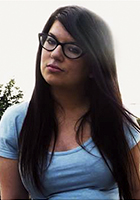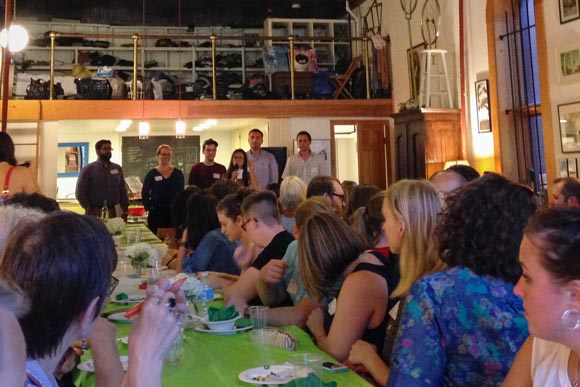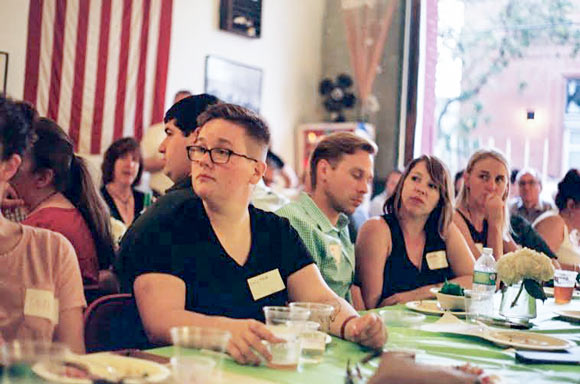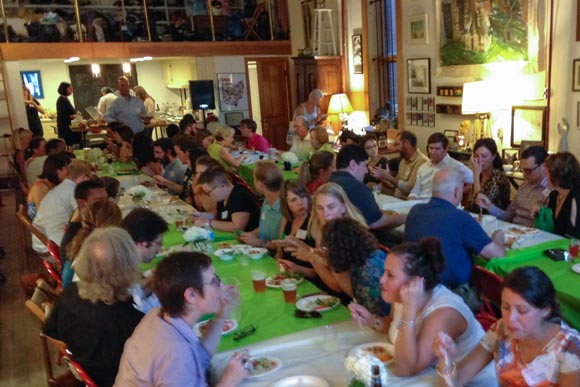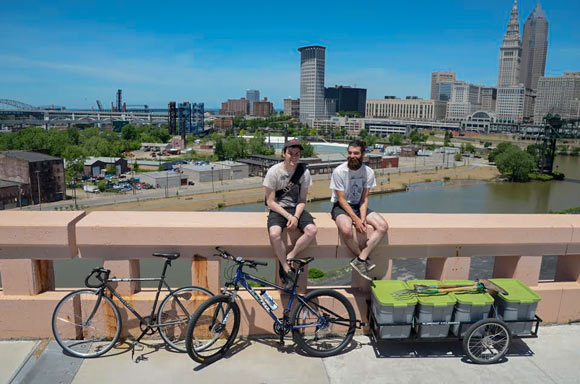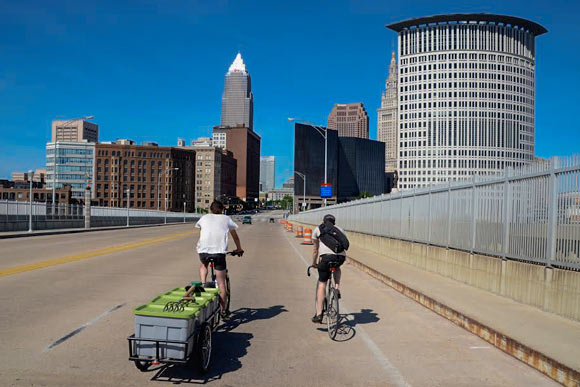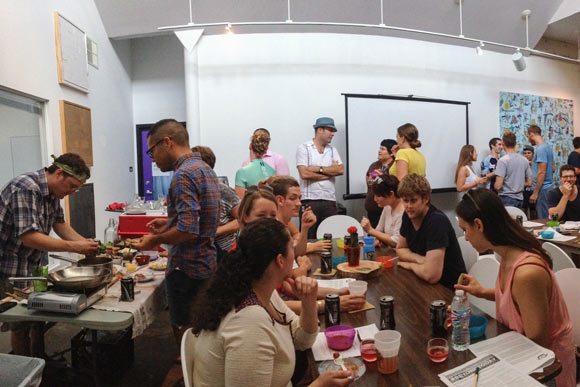SOUP's on: meal-based micro-grant program for creative projects takes root in cleveland
It was only a matter of time until SOUP came to town. Based on the dinner party model of the Sunday SOUP network, its concept is simple but far-reaching. Participants pay a donation at the door. While they eat soup, mix and mingle, a series of presenters pitch their big ideas for small-to-medium scale creative projects. At the end of the night, attendees vote and the winning proposal nets the entirety of the entrance donations.
For Rust Belt Riders, one of the five Cleveland organizations that presented at the city’s inaugural event in Ohio City, that meant taking home $2,000 to fuel their green efforts.
As garnering funds can often be one of the most relentless hurdles of independent upstarts, SOUP has helped offset those costs in more than 60 cities. And recently, the SOUP roster has grown to include an increasing number of Rust Belt regions.
Where it all began
The earliest organized SOUP events often are attributed to Chicago’s InCUBATE (Institute for Community Understanding Between Art and the Everyday) in 2006. But it’s only been over the past few years that more of Cleveland’s surrounding areas have begun to adopt the SOUP format.
The SOUP of St. Louis -- appropriately called Sloup -- has donated more than $25,000 since its inception in 2010. Northwest Ohio got in on the act in early 2012 thanks to Toledo SOUP, and Columbus SOUP followed close behind in 2013. Cincy Sundaes, Cincinnati’s version which swaps out the traditional soup for -- you guessed it -- ice cream, introduced its social earlier this year.
Most notable, perhaps, is Detroit SOUP, which has expanded since 2010 to include six satellite neighborhood events and a youth-based presentation. It was a grad school colleague’s accounts of Detroit’s events that inspired Marika Shioiri-Clark to organize Cleveland’s own.
“Once I moved to Cleveland, I thought it would be a great program to have here,” Shioiri-Clark explains. “It seemed like a way not only to raise money for community projects but to build community around something fun and casual.”
After bouncing the idea around between friends at an event held at the nearby Transformer Station art gallery, her hope was to be able to rally together 40 to 50 participants for the first SOUP. What she didn’t expect was a crowd of 100 to pack into her firehouse pad in Ohio City that she shares with her partner and SOUP co-host Graham Veysey.
Cleveland SOUP
Cleveland’s introduction to SOUP aligned nicely with the overarching goal of providing financial support for innovative, locally based initiatives. Pitches honed in on topics of sustainability, public art and diversity.
“I think people thought it refreshing that it was so easy,” says Shioiri-Clark. “The fact that you don’t need a 501(c)(3) to get the money, you don’t need any of these structures, and that it’s really just a way to support individual people in a community-focused way is appealing.”
Attendees heard first from Aseem Garg, who proposed to bring sustainable housing along the Opportunity Corridor in the form of urban Earthships. Caitie Hannon represented Cleveland Public Theatre’s returning production of Standing On Ceremony in hopes of raising money for a free performance of the marriage equality play. Daniel Brennan Brown explained the need for updated equipment for his neighborhood composting venture, Rust Belt Riders. David Jurca, Associate Director of the Cleveland Urban Design Collaborative (CUDC), spoke on the idea of not just surviving Cleveland winters but celebrating them through a Winter Guerilla Street Tactics and Tour. And Peter Debelak, owner of Soulcraft Woodshop, closed out the night with his strategy to engage youth in the creative woodworking craft in light of the phasing out of many high school hands-on learning classes.
After four-minute pitches from each presenter -- followed by a four-minute Q & A session -- all attendees are given one vote. Despite there being only one winner, SOUP provides an outlet of engaged listeners.
“We had a lot of people come up to us after that were interested in helping out and even offered to look at contributing a matching grant,” adds Shioiri-Clark.
The winner’s pot
Support showed strong for Rust Belt Riders, a cycling team that works in tandem with local restaurants to transport food waste to community gardens for composting. Rust Belt Riders co-founder Daniel Brennan Brown says he had been following the success of Detroit’s SOUP throughout the past year when he found out plans were being outlined for Cleveland.
“Everyone wants to be about the local food movement but it needs to be full circle,” Brown declared during his pitch. “There’s something missing from that ‘What happens to the food after its life cycle’s over?’”
With its $2,000 grant -- $1,780 by door and virtual donation and an additional $220 rounded up by Shioiri-Clark and Veysey -- the organization will be able to purchase a second trailer designed by a local vendor to pick up more scraps as Riders’ reach continues to grow.
“I officially connected with a number of people who I had only heard about or known through friends,” says Brown of his first SOUP. “The conversations were lively and everyone there brought something to the table, whether they were a presenter or a participant.”
Shioiri-Clark and Veysey hope to uphold SOUP’s tradition of quarterly hosting. With the help of Detroit SOUP, they’ve launched a website to announce their future plans and opportunities to submit proposals. While they haven’t decided the location of the next event, both organizers recognize the program’s potential to spark conversations wherever it takes place.
“The micro-grants weren’t the only thing that came out of the night,” says Veysey. “In addition to being able to present ideas, the vast majority of people walked in not knowing each other and when they walked out last night they’d met a neighbor, or someone who lives in a neighborhood next to them, and talked about a project that might not have been presented. I think there’s a value to neighbors meeting neighbors and people discovering the things that are happening around Cleveland, even if they weren’t necessarily part of the formal pitches.”
